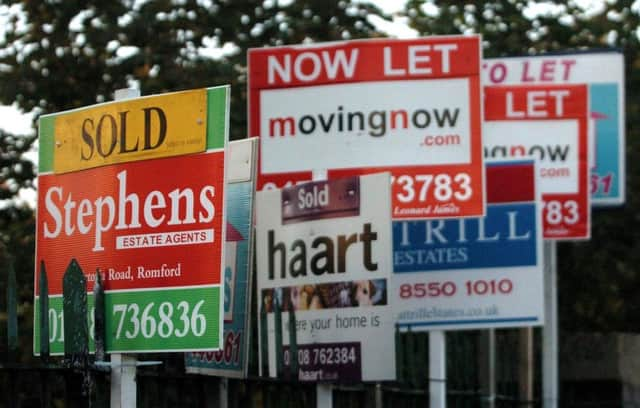Leaders: Politicians should consider moving costs


Reaching the first rung in today’s credit-stressed financial world is hard, but what most people fail to realise is that moving up the next step might be even costlier, levying a price on society that is more than just financial.
The reason is not obvious but still simple – the cost of moving home has been rising steeply at double the increase in other living costs and now averages nearly £12,000 in Britain. In Scotland the costs are just over £8,000, but that is still a heavy price to pay for realising the dream of a nicer home.
Advertisement
Hide AdAdvertisement
Hide AdInflation in the price of the removal men, the property surveyor, the lawyer, the estate agent and advertising all have had a role to play. So have politicians – stamp duties and their recent replacements have all been raised in the past ten years, and faster than the rate of inflation because, as property prices have risen, more and more houses have been lifted into higher tax brackets.
A survey found most people badly underestimate the likely cost of moving house, something which means that they may not be able to afford all those nice new furnishings, curtains and carpets. For those that do understand that the bills may be unaffordable, the solution is simple – don’t move. But that’s where hidden problems for society and the economy lurk.
For a young couple looking to start a family and move out of a city centre flat to a suburban house with garden, it may mean they are stuck with baby in what may well be manageable circumstances, but which are less than ideal to them, causing family tensions and stresses they don’t need.
Equally, elderly people in the kind of house to which the young couple aspire and looking to move to smaller accommodation may decide that the cost is too much of a penalty on the money they hoped to realise from a sale. The effect is to reduce the numbers of properties on the market, thereby contributing to property price inflation and worsening housing market problems.
There is a cost to the economy as well. The modern working world means that people are increasingly likely to have to move some distance to stay in work or further their career. But high property transaction costs mean they may not be able to do so, particularly if the move is from a low to high property price area.
People, therefore, may not be realising their full work potential and companies may not be able to recruit the staff they need. If they have to pay a relocation package, that imposes costs which companies don’t need, especially in times when they have to keep costs under strict control.
Property transaction taxes may look an easy revenue-raising option to politicians, but they may also be levying greater costs in lost revenues than would otherwise come from a more freely functioning property market with less expensive moving costs.
Accentuate the positive
Record numbers of people in Scotland – more than four million – are registered to vote this May. That is not surprising – last September’s independence referendum created an unsuspected appetite for active engagement with the democratic process which, judged by successive election turn-outs, had been on a long slow decline.
Advertisement
Hide AdAdvertisement
Hide AdThis election, therefore, is a great opportunity to continue reviving interest in political participation. But so far in the campaign, many politicians seem determined to foster disillusionment. Nothing puts voters off more than a constant stream of negativity descending into personalised insults and invective.
The Conservative “back-stabber” assault on Ed Miliband was the nastiest, but there has also been an endless series of “black hole” accusations from all sides to the point that the phrase must have lost all meaning. The row over what Nicola Sturgeon was supposed to have said to French diplomats reflects no credit on those who sought to capitalise without checking the facts.
Pointing out the flaws in opponents’ plans is, of course, a legitimate part of election campaigning. But a rather more important part is to offer positive visions and policies that offer hope.
The appetite for new aspirations was partly why the Yes campaign did rather better than expected. The hopes it offered, while flawed, convinced 45 per cent of a record number of voters to back it. It is inconceivable that thirst for something better has dissipated in six short months. Could this be why the SNP is riding so high in the polls? If it is, the lesson for other parties is clear – it’s time to talk about your own policies and to be positive about what you will do for people.
FOLLOW US
SCOTSMAN TABLET AND MOBILE APPS